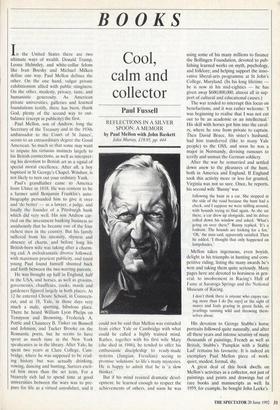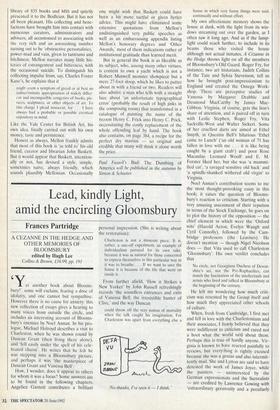BOOKS
Cool, calm and collector
Paul Fussell
REFLECTIONS IN A SILVER SPOON: A MEMOIR by Paul Mellon with John Baskett John Murray, £19.95, pp. 444 In the United States there are two ultimate ways of wealth. Donald Trump, Leona Helmsley, and white-collar felons like Ivan Boesky and Michael Milken define one way. Paul Mellon defines the other. On the one hand, vulgar private exhibitionism allied with public stinginess. On the other, modesty, privacy, taste, and humanistic generosity. As American private universities, galleries and learned foundations testify, there has been, thank God, plenty of the second way to out- balance (except in publicity) the first.
Paul Mellon, son of Andrew, long the Secretary of the Treasury and in the 1930s ambassador to the Court of St James', seems to an extraordinary degree the Good American. So much so that some may want to impute his virtuous instincts largely to his British connections, as well as interpret- ing his devotion to British art as a signal of special moral excellence. After all, a boy baptised in St George's Chapel, Windsor, is not likely to turn out your ordinary Yank.
Paul's grandfather came to America from Ulster in 1818. He was content to be a farmer until Benjamin Franklin's auto- biography persuaded him to give it over and 'do better' — as a lawyer, a judge, and finally the founder of a Pittsburgh bank which did very well. His son Andrew car- ried on the investment banking business so assiduously that he became one of the four richest men in the country. But his family suffered from his intensity, shyness and absence of charm, and before long his British-born wife was taking after a charm- ing cad. A melodramatic divorce followed, with maximum prurient publicity, and timid young Paul found himself shunted back and forth between the two warring parents.
He was brought up half in England, half in the USA, and horses, as well as grooms, governesses, chauffeurs, cooks, maids and gardeners figured largely in both places. At 12 he entered Choate School, in Connecti- cut, and at 18, Yale, in those days very Much a male, sporting, bibulous place. There he heard William Lyon Phelps on Tennyson and Browning, Frederick A. Pottle and Chauncey B. Tinker on Boswell and Johnson, and Tucker Brooke on the Romantic poets, but he seems to have spent as much time in the New York speakeasies as in the library. After Yale, he spent two years at Clare College, Cam- bridge, where he was supposed to be read- ing history but was actually drinking, rowing, dancing and hunting. Surtees excit- ed him more than the set texts. For a bizarrely rich lad to spend time at good universities between the wars was to pre- pare for life as a virtual autodidact, and it
could not be said that Mellon was extruded from either Yale or Cambridge with what could be called a highly trained mind. Rather, together with his first wife Mary (she died in 1946), he tended to offer his enthusiastic discipleship to ready-made systems (Jungian, Freudian) seeing to promise 'solutions to life's many mysteries. He is happy to admit that he is 'a slow thinker.'
But if his mind resisted dramatic devel- opment, he learned enough to respect the achievements of others, and soon he was using some of his many millions to finance the Bollingen Foundation, devoted to pub- lishing learned works on myth, psychology, and folklore; and helping support the inno- vative liberal-arts programme at St John's College, Maryland. (In his long lifetime — he is now in his mid-eighties — lie has given away $600,000,000, almost all in sup- port of cultural and educational causes.)
The war tended to interrupt this focus on benefactions, and it was rather welcome: 'I was beginning to realise that I was not cut out to be an academic or an intellectual.' His skill with horses got him into the caval- ry, where he rose from private to Captain. Then David Bruce, his sister's husband, had him transferred (like to many Yale people) to the OSS, and soon he was a major in Normandy, devising rumours to terrify and unman the German soldiery.
After the war he remarried and settled down anew to the pleasures of the hunt, both in America and England. If England took this activity more or less for granted, Virginia was not so sure. Once, he reports, his second wife 'Bunny' was
following the hunt in a car. She stopped at the side of the road because the hunt had a check, and I suppose we were milling around, with hounds trying to find again. As she sat there, a car drew up alongside, and its driver rolled down his window and asked, 'What's going on over there'?' Bunny replied, 'It's a foxhunt. The hounds are looking for a fox.' 'Oh,' the man said, apparently satisfied. Then he added, 'I thought that only happened on lampshades.'
Mellon takes ingenuous, even boyish, delight in his triumphs in hunting and com- petitive riding, listing the many awards he's won and taking them quite seriously. Many pages here are devoted to horsiness in gen- eral, to involvement in Racing's Hall of Fame at Saratoga Springs and the National Museum of Racing.
I don't think there is anyone who enjoys rac- ing more than I do the says] or the sight of mares and foals grazing in green fields, or yearlings running wild and throwing them- selves about.
His devotion to George Stubbs's horse portraits followed quite naturally, and after all these years and intense scrutiny of many thousands of paintings, French as well as British, Stubbs's 'Puinpkin with a Stable Lad' remains his favourite. It is indeed an exemplary Paul Mellon piece of work: quiet, modest, formal, shy.
A great deal of this book dwells on Mellon's activities as a collector, not just of paintings and prints and drawings but of rare books and manuscripts as well. In 1959, for example, he bought John Locke's library of 835 books and MSS and quietly presented it to the Bodleian. But it has not all been pleasant. His collecting and bene- factions have brought him into contact with numerous curators, administrators and advisers, all accustomed to associating with the very rich and an astonishing number turning out to be 'obstructive personalities,' power-mad and vain, given to tantrums and bitchiness. Mellon narrates many little his- tories of estrangement and bitterness, with the occasional suicide. To distinguish his collecting impulse from, say, Charles Foster Kane's, he explains that it
might seem a symptom of greed or at best an indiscriminate appropriation of widely differ- ent and incompatible congeries of books, pic- tures, sculptures, or other objects of art. To this charge I plead innocent, for . . . I have always had a probable or possible eventual repository in mind.
Like the Yale Center for British Art, his own idea, finally carried out with his own money, taste and persistence.
Honest as always, Mellon frankly admits that most of this book is 'as told to' his old friend, curator and librarian John Baskett. But it would appear that Baskett, intention- ally or not, has devised a style, simple, sometimes naive, always friendly, which sounds plausibly Me!Ionian. Occasionally one might wish that Baskett could have been a hit more tactful or given better advice. This might have eliminated some extensive quotations from Mellon's undistinguished very public speeches as well as an embarrassing appendix listing Mellon's honorary degrees and `Other Awards,' most of them indications rather of institutional gratitude than learned merit.
But in general the book is as likeable as its subject, who, among many other virtues, is content to own a yacht which is not a Robert Maxwell monster showpiece but a mere 27-foot sloop, which he likes to putter about in with a friend or two. Readers will also admire a man who tells with a straight face about 'an unfortunate typographical error' (probably the result of high jinks in the composing room) that transformed in a catalogue of painting the name of the tycoon Henry C. Frick into Henry C. Prick, necessitating the costly replacement of the whole offending leaf by hand. The book also contains, on page 384, a recipe for the perfect dry martini — so original and credible that many will think it alone worth the price.
Paul Fussell's Bad: The Dumbing of America will be published in the autumn by Simon & Schuster.



























































 Previous page
Previous page